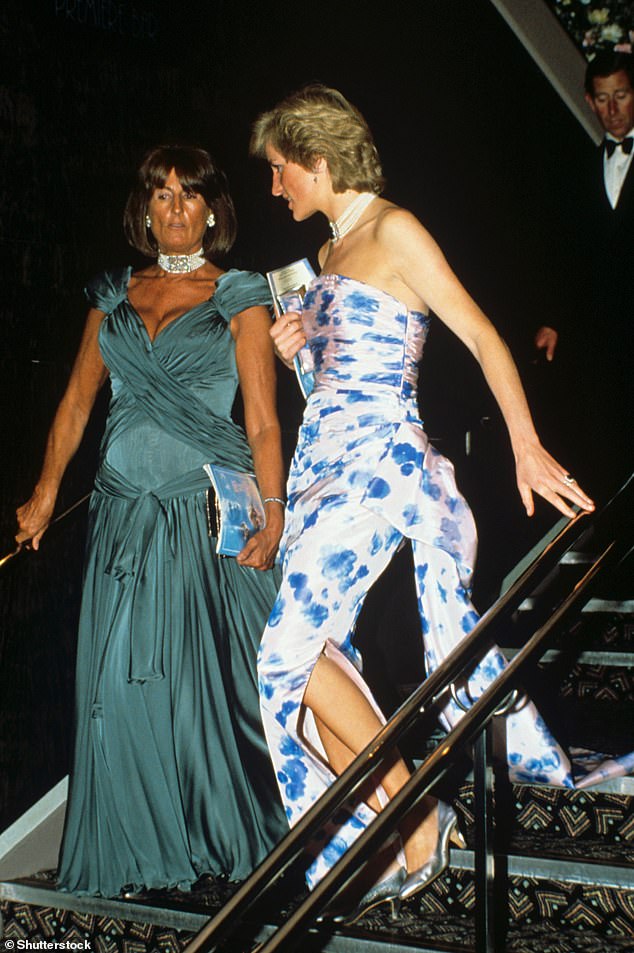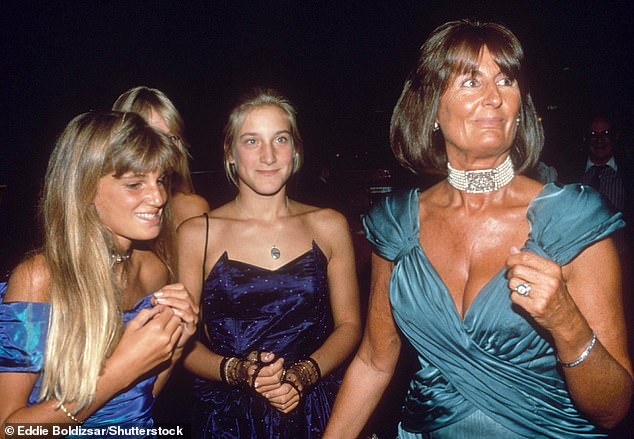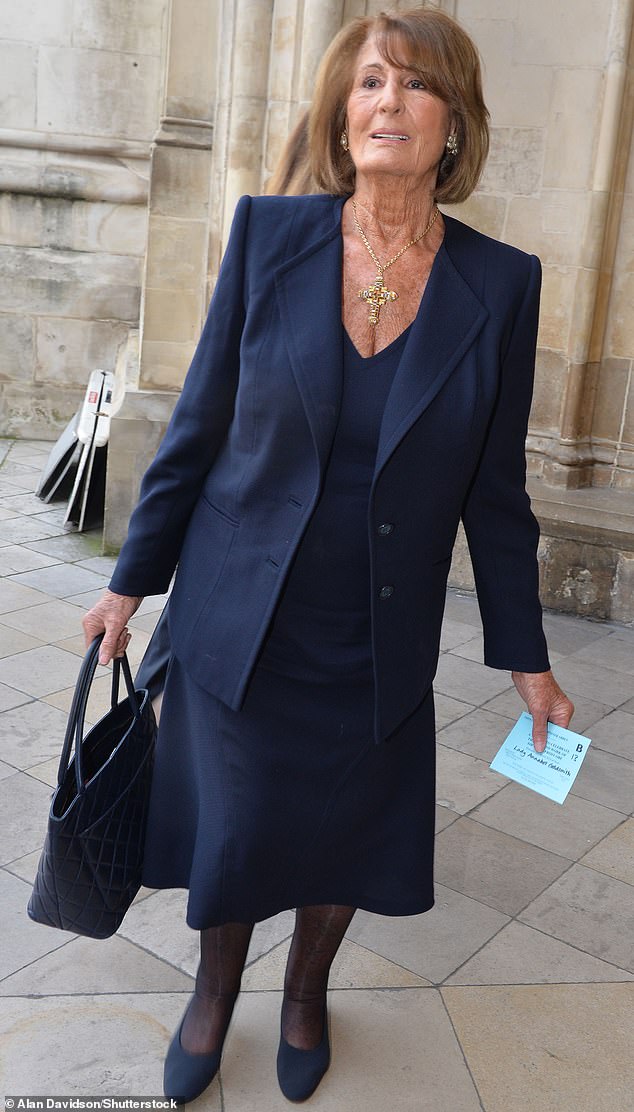Of all the figures drawn into the vortex of Princess Diana’s life, Lady Annabel Goldsmith was unique.
A staunch friend and dispenser of mature wisdom, she was also a surrogate mother whose elegant home on the edge of Richmond Park became a refuge for the princess.
But what really stood Lady Annabel apart from any other confidante Diana could turn to was her position on the other side of the royal marriage crisis – her friendship with the circle around Camilla Parker Bowles, now the Queen.
Everyone else had been forced to take a side as the domestic happiness of the Prince and Princess of Wales unravelled in the 1980s and 1990s. But not Lady Annabel, whose death aged 91, was announced by her ‘bereft’ family on Saturday.
Somehow the widow of the mercurial financier Sir James Goldsmith, remained impervious. Her affection for Diana was steadfast and uncompromising – yet she continued, almost to the end, to be a regular on royal guestlists. As recently as July, she could be found in the royal box at Wimbledon.
It was perhaps fitting that she should die at her sprawling Georgian house in south-west London. It was central to her existence as family matriarch, the place where she brought up her three youngest children – Zac, a peer and former Tory MP, Jemima, a screenwriter and film producer, and Ben, a businessman and environmentalist.
Every year, Ormeley Lodge would play host to one of the hottest social tickets: Lady Annabel’s annual summer party. But it was another party that was to for ever cement her role in the royal story – the night that Princess Diana confronted her rival over her affair with Prince Charles in an unforgettable showdown.
The occasion was the 40th birthday party of Camilla’s younger sister Annabel Elliot, which Lady Annabel had agreed to host. This was 1989, long before news of the princess’s deep misery had reached the ears of the public, but it was already an open secret among the friends who carefully pirouetted around Charles and Diana.

A staunch friend and dispenser of mature wisdom, Lady Annabel was also a surrogate mother whose elegant home on the edge of Richmond Park became a refuge for the princess

Lady Annabel’s role in the royal story was established on the night that she hosted the 40th birthday party of Queen Camilla’s younger sister, Annabel Elliot
It was to be another three years before the couple officially separated but it was the night that Diana was forced to realise that her marriage was effectively over.
Years later, sitting at her kitchen table, Lady Annabel told me about the dramatic encounter. Although she had long been close to Diana, to whom she was a mother figure, Annabel did not expect her friend to come to the party. She had been invited as the prince’s wife as a courtesy.
‘Yes, Diana’s name was on the invitation, but everyone knew that she always steered clear of anything where Camilla was involved,’ she said. ‘I never thought for a minute she’d come.’
But with a plan forming in her mind, the princess decided to accept at the eleventh hour, even though she knew the party would be filled with her husband’s sycophantic friends. Naturally, she informed Lady Annabel, bringing flowers with her to make amends.
The party had an Indian theme, but Diana’s presence was a far more destabilising prospect than any dress code.
One person, in particular, was unnerved by the news: Camilla.
Lady Annabel recalled how Mrs Parker Bowles, in those days a smoker, puffed endlessly on cigarettes and complained bitterly about this unexpected turn of events as she dressed for the party in one of Ormeley Lodge’s guest rooms. ‘The language was pretty fruity,’ Lady Annabel recalled.
Although outwardly calm, the hostess knew she would need all her sophisticated charm to ensure that the evening did not become a social catastrophe.
If nothing else, she owed it to the party girl, Mrs Elliot, who was a close friend, and she was determined that the celebration should not be spoiled. But at the same time, she told me that she couldn’t bear the thought of the princess being humiliated in front of people who were not her greatest fans.

Although outwardly calm, the hostess knew she would need all her sophisticated charm to ensure that the evening did not become a social catastrophe.

‘Yes, Diana’s name was on the invitation, but everyone knew that she always steered clear of anything where Camilla was involved,’ Lady Annabel told RICHARD KAY years later
The 100 guests were seated at circular tables of ten and, ever the diplomat, Lady Annabel had ensured that Charles and Diana were placed some distance from Camilla.
Diana was dazzling that February night, but Charles was not among her admirers. She said later that he spent the entire nine-mile journey from Kensington Palace to the Goldsmiths’ house expressing irritation about why she had decided to come.
It was late in the evening when the encounter finally took place. Most of the guests, including the princess, had moved upstairs to a drawing room, but not Charles and Camilla. When Diana went back down to see where Charles was, she found him and Camilla sitting together at a table talking with a male friend.
As a rule, Diana went out of her way to avoid confrontation, but this time she came marching up. ‘Can you leave us,’ she announced to Charles and the other man. ‘I want to talk to Camilla alone.’
As they meekly scuttled away, the prince murmured: ‘I feel like a naughty schoolboy.’ The remark may have been intended to lighten the ominous atmosphere, but Charles was fearful that Diana was going to cause an embarrassing scene. At this moment, Lady Annabel tactfully stepped in and offered the prince a tour of her Grade II-listed mansion.
What happened next is part of royal history. The princess told Camilla: ‘I would just like you to know that I know exactly what is going on. I’m sorry I’m in the way. It must be hell for both of you… don’t treat me like an idiot.’
As Diana later related, Camilla’s response was to tell her: ‘You’ve got everything you ever wanted. You’ve got all the men in the world falling in love with you and you’ve got two beautiful children. What more could you want?’
To which the princess answered: ‘I want my husband.’
Far from saving her marriage, the party marked the beginning of the end. But it also deepened the bond between Lady Annabel and Princess Diana.
It was remarkable that the woman who gave her name to London’s swankiest nightclub was able to offer the generous and unconditional affection that was so obviously missing from Diana’s life.
Their friendship even survived a far-fetched rumour that the princess’s father was not the aristocratic 8th Earl Spencer but Lady Annabel’s libidinous husband Sir James.
Sundays for the separated princess were especially bleak. With no official engagements to fill her day, she frequently found herself at Ormeley Lodge sitting down to riotous family lunches with Lady Annabel, who had three older children by her first marriage to nightclub entrepreneur Mark Birley.
Often Prince William would come out from school at Eton to join these colourful gatherings. ‘All sorts of people would drop in,’ said Lady Annabel. ‘Diana adored it all: the fuss, the clutter, the dogs.’
For her part, Diana loved Annabel’s pragmatic view of life. For all her privilege, she had suffered unbearable loss, including the death of her eldest son Rupert in a suspected drowning, and the princess adored her just-get-on-with-it spirit.
There was to be one more significant role in the princess’s life, which also involved Lady Annabel’s daughter Jemima, who at the time was married to the handsome former Pakistan cricket captain-turned-politician Imran Khan. With Diana deeply involved with heart surgeon Hasnat Khan, Annabel agreed to accompany her to Pakistan, where his family lived. ‘The princess wanted to see for herself if she could live there and adjust, as my daughter had, to the culture,’ she said.
Annabel was also one of the few friends to whom Diana confided that she had no intention of marrying Dodi Fayed. She reminded me of this in a letter she wrote to me after the princess was killed. She told me that her friend’s death had drained the colour out of London.
Many would say the same of the passing of Lady Annabel Goldsmith.